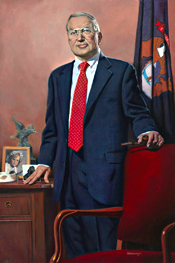William D. Ford
William David Ford (born August 6, 1927 in Detroit , Michigan , † August 14, 2004 in Ypsilanti , Michigan) was an American politician . Between 1965 and 1995 he represented the state of Michigan in the US House of Representatives .
Career
William Ford attended Henry Ford Trade School , Melvindale High School , Nebraska State Teachers College, and Wayne State University . During the Second World War he suspended his training to serve in the US Navy from 1944 to 1946 . From 1950 to 1958 he was a member of the Air Force Reserve . After the war he continued his education at the University of Denver until 1949 . After a subsequent law degree at this university and his admission as a lawyer in 1951, he began to work in Taylor Township in his new profession.
Between 1955 and 1957 Ford was Justice of the Peace in Taylor; from 1957 to 1959 he was the legal representative of the Melvindale community . In 1961 and 1962 he was a delegate to a meeting to revise the Michigan constitution. Politically, he was a member of the Democratic Party . He was a member of the Michigan Senate from 1962 to 1964 . From 1952 to 1964 he held leading positions in the 16th party district of the Democrats at the state level. He was also a delegate to all party conventions in Michigan between 1952 and 1970. In 1968 he also took part in the Democratic National Convention in Chicago , where Hubert H. Humphrey was nominated as a presidential candidate.
In the 1964 congressional elections , Ford was elected to the 15th constituency of Michigan in the US House of Representatives in Washington, DC , where he succeeded John Dingell on January 3, 1965 . After 14 re-elections, he was able to complete a total of 15 legislative terms in Congress by January 3, 1995 . Since 1993 he represented the 13th district of his state there; he had swapped constituencies with Barbara-Rose Collins . Between 1981 and 1991 he was chairman of the Committee on Post Office and Civil Service . He then headed the Education and Working Committee from 1991 to 1995 . The Vietnam War ended during Ford's 30-year term in Congress . In 1974 he witnessed the Watergate affair there . In addition, the 25th , 26th and 27th amendments to the constitution were discussed and passed during this period .
In 1994, William Ford decided not to run again. After leaving the US House of Representatives, he withdrew from politics. He died on August 14, 2004 in Ypsilanti and was buried in Arlington National Cemetery in Virginia .
Web links
- William D. Ford in the Biographical Directory of the United States Congress (English)
- William D. Ford in the database of Find a Grave (English)
| personal data | |
|---|---|
| SURNAME | Ford, William D. |
| ALTERNATIVE NAMES | Ford, William David (full name) |
| BRIEF DESCRIPTION | American politician |
| DATE OF BIRTH | August 6, 1927 |
| PLACE OF BIRTH | Detroit , Michigan |
| DATE OF DEATH | August 14, 2004 |
| Place of death | Ypsilanti , Michigan |

